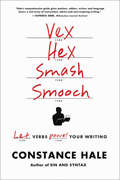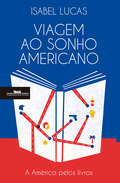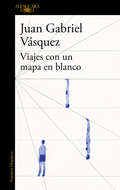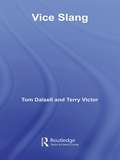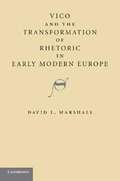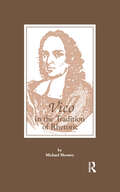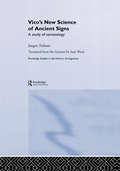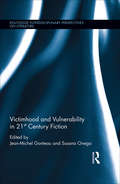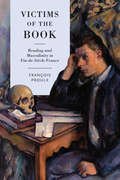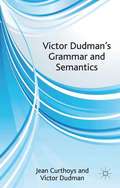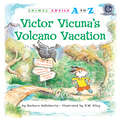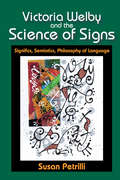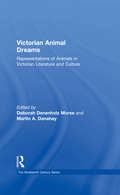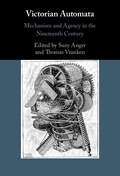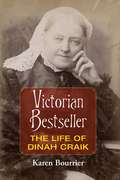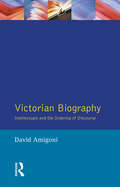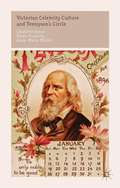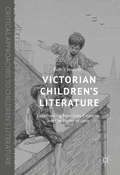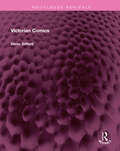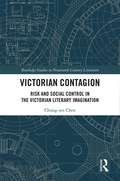- Table View
- List View
Veteran Poetics: British Literature in the Age of Mass Warfare, 1790–2015
by Kate McLoughlinIn this first full-length study of the war veteran in literature, Kate McLoughlin draws new critical attention to a figure central to national life. Offering fresh readings of canonical and non-canonical works, she shows how authors from William Wordsworth to J. K. Rowling have deployed veterans to explore questions that are simultaneously personal, political, and philosophical: What does a community owe to those who serve it? What can be recovered from the past? Do people stay the same over time? Are there right times of life at which to do certain things? Is there value in experience? How can wisdom be shared? Veteran Poetics features veterans who travel in time, cause havoc with their reappearances, solve murders, refuse to stop talking about the wars they have been in, and refuse to say a word about them. Through this last trait, they also prompt consideration of possible critical responses to silence.
Vex, Hex, Smash, Smooch: Let Verbs Power Your Writing
by Constance HaleA writing handbook that celebrates the infinite pizzazz of verbs. Writers know it instinctively: Verbs make a sentence zing. Grammar gurus agree: Drama in writing emerges from the interplay of a subject (noun) and a predicate (verb). Constance Hale, the best-selling author of Sin and Syntax, zooms in on the colorful world of verbs. Synthesizing the pedagogical and the popular, the scholarly and the scandalous, Hale combines the wit of Bill Bryson with the practical wisdom of William Zinsser. She marches through linguistic history to paint a layered picture of our language--from before it really existed to the quirky usages we see online today. She warns about habits to avoid and inspires with samples of brilliant writing. A veteran teacher, Hale gives writing prompts along the way, helping readers "try, do, write, play." Vex, Hex, Smash, Smooch guides us to more powerful writing by demonstrating how to use great verbs with style.
Viagem ao sonho americano
by Isabel LucasUma viagem literária (e muito mais) pelos Estados Unidos da América, com Trump em pano de fundo. UM DOS MELHORES LIVROS DO ANO: Revista Visão * Comunidade Cultura e Arte * blogue literário Deus me livro O que é a América? Numa viagem pelo país que (ainda) é visto como o centro do mundo, Isabel Lucas sonda a condição americana, os seus mitos, paradoxos, medos e fragilidades, mas também a sua grandeza e capacidade de reinvenção. O ponto de partida para esta viagem foi a literatura, esse território onde ainda há lugar para questionar, desconstruir, reimaginar. Partiu de autores e obras de referência e explorou as suas geografias: a New Bedford de Moby Dick, a Newark de Philip Roth, o Texas de Cormac McCarthy, o Sul de Toni Morrison, o mapa da classe média de Richard Ford e John Updike, entre muitos outros. Nestes e noutros lugares, reais e imaginados, encontrou uma América que tem medo de se olhar nos olhos e outra América, a que quer olhar para dentro para se purgar dos males e avançar. Descobriu uma América que se fecha perante o desconhecido e outra América, a que vê na diferença a sua maior riqueza. Partindo dos livros, esta é também, inevitavelmente, uma viagem pelas ruas da América, pelas suas gentes, pelas vozes anónimas e pelos seus mitos, entre eles, o tal sonho fundador. Afinal, o que é o sonho americano? Será o sonho de um país ou o sonho de um mundo inteiro? Os elogios da crítica: «A propósito de sonho, não posso deixar de ressalvar, neste livro da Isabel, o privilégio de termos simultaneamente a repórter que nos descreve com argúcia e sensibilidade os muitos lugares de que se faz uma viagem de um ano e 97.000 quilómetros, a entrevistadora que nos revela os nossos semelhantes, iluminando-os, a critica literária que escolheu dezasseis obras fundamentais da literatura norte americana e depois acrescentou outras tantas, e finalmente a viajante aventureira.»Dulce Maria Cardoso «Nesta jornada intimista encontramos uma aventura de escrita pessoalíssima, ao mesmo tempo humana e intelectual.»José Mário Silva, Expresso «Jornalismo no seu melhor. Daquele que exige tempo, tempo para fazer e tempo para digerir.» Pedro Dias de Almeida, Visão «Apresenta a América de uma perspectiva muitíssimo original. O livro merece, a todos os títulos, figurar como uma das melhores e mais originais obras produzidas nos últimos anos em matéria de literatura de viagens.»António Araújo, Público «Este livro é um pedaço de grande literatura que merece ser amplamente lido e receber prémios.»Vasco Rosa, Observador «Um livro que está entre o jornalismo old school feito à séria e uma escrita perfumada e inspirada. Para o leitor, trata-se de um verdadeiro festim.»Pedro Miguel Silva, Deus me livro «Entre os melhores livros de não ficção do ano. A não perder.»Marco Alves, Sábado
Viajes con un mapa en blanco
by Juan Gabriel VásquezUna colección de ensayos sobre el arte de la novela, por el ganador del Premio IMPAC y el Premio Alfaguara de Novela. Los seres humanos, sostiene este libro, no hemos inventado la novela: es la novela la que nos ha inventado a nosotros. Pero ¿qué nos dan las novelas que no nos puede dar ninguna otra forma narrativa? ¿Qué lugar ocupan en nuestras vidas como individuos y como sociedades? ¿Por qué son, según Vásquez, una manera irremplazable de investigarnos a nosotros mismos, y cómo llevan a cabo sus sortilegios? De Cervantes a Conrad, de Tolstoi a Vargas Llosa, de Proust a Camus, estos ensayos proponen un elogio de ese género proteico y también, entre líneas, un lamento por su situación presente en un mundo que se le ha vuelto hostil. «Un novelista que escribe ensayos, y en particular si esos ensayos hablan del arte de la novela, es como un náufrago que manda coordenadas: quiere decirles a los demás cómo pueden encontrarlo. También, por supuesto, quiere encontrarse a sí mismo; en otras palabras, saber cómo debe leer las novelas que escribe. El ensayo es una exploración, una tentativa, una averiguación, y el novelista escribe para descubrir y trazar los límites de sus conocimientos y la forma de sus certezas. En ese sentido, podría decir uno, es un género confesional.»Juan Gabriel Vásquez Reseñas:«Juan Gabriel Vásquez lidera la generación de escritores que están reinventando la literatura latinoamericana para el siglo XXI.»Jonathan Franzen «Una de las voces más originales de la nueva literatura latinoamericana.»Mario Vargas Llosa «Un escritor superdotado [...]. Uno de los escritores mayores del mundo hispánico.»Thierry Clermont, Le Figaro «Uno de los escritores más grandes del mundo.»Andrea Bajani, La Repubblica «Vásquez es el novelista colombiano más erudito e inventivo de laactualidad.»Amanda Hopkinson, The Independent «Vásquez ha acumulado una obra impresionante, una de las más impactantes que hayan surgido en Latinoamérica en lo que va del siglo.»David Gallagher, The New York Review of Books «Vásquez es uno de los grandes autores de hoy, sin distinción de territorio.»Mathias Enard «Un maestro en el arte de estudiar las grietas y las existencias que toman por el camino equivocado [...]. Un escritor consumado que domina tanto las formas breves como la novela.»Livres Hebdo
Vice Slang
by Tom Dalzell Terry VictorAre you a bit of a chairwarmer? Do you use the wins from a country straight to get scudded on snakebite in a blind tiger? Do you ride the waves on puddle or death drop? Vice Slang gently eases you into the language of gambling, drugs and alcohol, providing you with 3,000 words to establish yourself firmly in the world of corruption and wickedness. All words are illustrated by a reference from a variety of sources to prove their existence in alleys and dives throughout the English speaking world. This entertaining book will give you hours of reading pleasure.
Vico and the Transformation of Rhetoric in Early Modern Europe
by David L. MarshallConsidered the most original thinker in the Italian philosophical tradition, Giambattista Vico has been the object of much scholarly attention but little consensus. In this new interpretation, David L. Marshall examines the entirety of Vico's oeuvre and situates him in the political context of early modern Naples. He demonstrates Vico's significance as a theorist who adapted the discipline of rhetoric to modern conditions. Marshall presents Vico's work as an effort to resolve a contradiction. As a professor of rhetoric at the University of Naples, Vico had a deep investment in the explanatory power of classical rhetorical thought, especially that of Aristotle, Cicero, and Quintilian. Yet as a historian of the failure of Naples as a self-determining political community, he had no illusions about the possibility or worth of democratic and republican systems of government in the post-classical world. As Marshall demonstrates, by jettisoning the assumption that rhetoric only illuminates direct, face-to-face interactions between orator and auditor, Vico reinvented rhetoric for a modern world in which the Greek polis and the Roman res publica are no longer paradigmatic for political thought.
Vico in the Tradition of Rhetoric
by Michael MooneyIf among the many truths of Giambattista Vico's New Science there is one that is deepest, it is the truth that language, mind, and society are but three modes of a common reality. In Vico's term, that reality is the monde civile, the world of man. It is a world of many guises and faces. If reflected in a mirror, those faces would reveal an image of the full array of contemporary arts and sciences, all the disciplines of learning and technique by which, so Vico judged, humanity attains its perfection. Humanity in its perfection, however, is so rare a moment, so delicate and subtle a state, that it is never to be found among the nations of the world -- or is found in so fragile a form that it threatens always to crack and fall to the ground. In the West, a persistent line of thinking that has flourished from time to time holds that language is primary in culture, metaphor a necessity, and jurisprudence our highest achievement. This was the position of Vico, who not only received and cherished the tradition, but looked deeply into it, saw what its principles implied, and so made ready for the great social theorists of the nineteenth century. That is the thesis of this work. After an introductory chapter on Vico himself -- in which his intellectual world and his movements within it are sketched -- the work unfolds in three parts. These parts successively treat rhetoric, pedagogy, and culture, each proceeding from a major Vichian text.
Vico's New Science of Ancient Signs: A Study of Sematology
by Jürgen TrabantJürgen Trabant reads the profound insights into human semiosis contained in Vico's 'sematology' as both a spirited rejection of Cartesian philosophy and an early critique of enlightened logocentricism. Sean Ward's translation makes this work available to an English-reading audience for the first time.
Vicos New Science Ancient Sign
by Jurgen TrabantJürgen Trabant reads the profound insights into human semiosis contained in Vico's 'sematology' as both a spirited rejection of Cartesian philosophy and an early critique of enlightened logocentricism. Sean Ward's translation makes this work available to an English-reading audience for the first time.
Victimhood and Vulnerability in 21st Century Fiction (Routledge Interdisciplinary Perspectives on Literature)
by Susana Onega Jean-Michel GanteauEditors Jean-Michel Ganteau and Susana Onega) have assembled a volume which addresses the relationship between trauma and ethics, and moves one step further to engage with vulnerability studies in their relation to literature and literary form. It consists of an introduction and of twelve articles written by specialists from various European countries and includes an interview with US novelist Jayne Anne Philips, conducted by her translator into French, Marc Amfreville, addressing her latest novel, Quiet Dell, through the victimhood-vulnerability prism. The corpus of primary sources on which the volume is based draws on various literary backgrounds in English, from Britain to India, through the USA. The editors draw on material from the ethics of alterity, trauma studies and the ethics of vulnerability in line with the work of moral philosophers like Emmanuel Levinas, as well as with a more recent and challenging tradition of continental thinkers, virtually unknown so far in the English-speaking world, represented by Guillaume Le Blanc, Nathalie Maillard, and Corinne Pelluchon, among others. Yet another related line of thought followed in the volume is that represented by feminist critics like Catriona McKenzie, Wendy Rogers and Susan Dodds.
Victimhood in American Narratives of the War in Vietnam
by Aleksandra MusiałThis book revisits the American canon of novels, memoirs, and films about the war in Vietnam, in order to reassess critically the centrality of the discourse of American victimization in the country’s imagination of the conflict, and to trace the strategies of representation that establish American soldiers and veterans as the most significant victims of the war. By investigating in detail the imagery of the Vietnamese landscape recreated by American authors and directors, the volume explores the proposition that Vietnam has been turned into an American myth, demonstrating that the process resulted in a dehistoricization and mystification of the conflict that obscured its historical and political realities. Against this background, representations of the war’s victims—Vietnamese civilians and American soldiers—are then considered in light of their ideological meanings and uses. Ultimately, the book seeks to demonstrate how, in a relation of power, the question of victimhood can become ideologized, transforming into both a discourse and a strategy of representation—and in doing so, to demythologize something of the "Vietnam" of American cultural narrative.
Victims of the Book: Reading and Masculinity in Fin-de-Siècle France (University of Toronto Romance Series)
by Francois ProulxVictims of the Book uncovers a long-neglected but once widespread subgenre: the fin-de-siècle novel of formation in France. Novels about and geared toward adolescent male readers were imbued with a deep worry over young Frenchmen’s masculinity, as evidenced by titles like Crise de jeunesse (Youth in Crisis, 1897), La Crise virile (Crisis of Virility, 1898), La Vie stérile (A Sterile Life, 1892), and La Mortelle Impuissance (Deadly Impotence, 1903). In this book, François Proulx examines a wide panorama of these novels, many of which have rarely been studied, as well as polemical essays, pedagogical articles, and medical treatises on the perceived threats posed by young Frenchmen’s reading habits. Against this cultural backdrop, he illuminates all that was at stake in representations of the male reader by prominent novelists of the period, including Jules Vallès, Paul Bourget, Maurice Barrès, André Gide, and Marcel Proust. In the final decades of the nineteenth century, social commentators insistently characterized excessive reading as an emasculating illness that afflicted French youth. Fin-de-siècle writers responded to this pathologization of reading with a profusion of novels addressed to young male readers, paradoxically proposing their own novels as potential cures. In the early twentieth century, this corpus was critically revisited by a new generation of writers. Victims of the Book shows how Gide and Proust in particular reworked the fin-de-siècle paradox to subvert cultural norms about literature and masculinity, proposing instead a queer pact between writer and reader.
Victor Dudman’s Grammar and Semantics
by Jean Curthoys Victor H. DudmanVictor Dudman's revolutionary English Grammar brings grammar and logic together by conceiving grammar as 'the necessary preliminary to logic'. The focus, for logicians, is the discussion of 'conditionals'; for grammarians it is the concise and accurate explanation of the infamous English modals.
Victor Hugo, Jean-Paul Sartre, and the Liability of Liberty
by Bradley Stephens"The arch-Romantic Victor Hugo (1802-85) and the Existentialist philosopher Jean-Paul Sartre (1905-80) are widely perceived to have little in common beyond their canonical status. However, responding to Sartre's often overlooked fascination with Hugo, Bradley Stephens cuts through generic divisions to argue that significant parallels between the two writers have been neglected. Stephens argues that both Hugo and Sartre engage with human beings in distinctly non-ontological terms, thereby anticipating postmodernist approaches to human experience. From different origins but towards similar realisations, they expose the indeterminate human condition as at once release and restriction. These writers insist that liberty is not simply a political ideal, but an existential condition which engages human endeavour as a dynamic rather than definitive mode of being. This incisive new book affirms the ongoing relevance of the two most iconic French writers of the modern period to contemporary discourse on what it means to be free."
Victor Hugo, Romancier de l'Abime: New Studies on Hugo's Novels
by James Hiddleston"This study of Victor Hugo's work aims to uncover the diversity, the thematic and narrative singularity, and the shifting ironies and resistance to interpretative closure of his writing. Novels examined include: ""Notre-Dame de Paris"", ""Les Miserables"", ""Les Travailleurs de la Mer"", ""Quatre vingt-treize"", and ""L'Homme qui Rit"". The 11 essays in the volume bring together various critical approaches from French, British and American scholars, in an attempt to provide a new point of departure and to provoke discussion of Victor Hugo's novels. This publication marks the bicentenary of Hugo's birth in 1802."
Victor Vicuna's Volcano Vacation (Animal Antics A to Z)
by Barbara deRubertisShiver River, Vampire Cave, Stove-Top Volcano, and a mysterious raven named Nevva Moore. . . . Victor Vicuna is in for some very exciting adventures during his family’s vacation at Verna Aardvark’s Volcano Village!
Victoria Welby and the Science of Signs: Significs, Semiotics, Philosophy of Language
by Susan PetrilliVictoria Welby (1837–1912) dedicated her research to the relationship between signs and values. She exchanged ideas with important exponents of the language and sign sciences, such as Charles S. Peirce and Charles S. Ogden. She examined themes she believed crucially important both in the use of signs and in reflection on signs. But Welby's research can also be understood in ideal dialogue with authors she could never have met in real life, such as Mikhail Bakhtin, Susanne Langer, and Genevieve Vaughan.Welby contends that signifying cannot be constrained to any one system, type of sign, language, field of discourse, or area of experience. On the contrary, it is ever more developed, enhanced, and rigorous, the more it develops across different fields, disciplines, and areas of experience. For example, to understand meaning, Welby evidences the advantage of translating it into another word even from the same language or resorting to metaphor to express what would otherwise be difficult to conceive.Welby aims for full awareness of the expressive potential of signifying resources. Her reflections make an important contribution to problems connected with communication, expression, interpretation, translation, and creativity.
Victorian Animal Dreams: Representations of Animals in Victorian Literature and Culture (The Nineteenth Century Series)
by Deborah Denenholz MorseThe Victorian period witnessed the beginning of a debate on the status of animals that continues today. This volume explicitly acknowledges the way twenty-first-century deliberations about animal rights and the fact of past and prospective animal extinction haunt the discussion of the Victorians' obsession with animals. Combining close attention to historical detail with a sophisticated analytical framework, the contributors examine the various forms of human dominion over animals, including imaginative possession of animals in the realms of fiction, performance, and the visual arts, as well as physical control as manifest in hunting, killing, vivisection and zookeeping. The diverse range of topics, analyzed from a contemporary perspective, makes the volume a significant contribution to Victorian studies. The conclusion by Harriet Ritvo, the pre-eminent authority in the field of Victorian/animal studies, provides valuable insight into the burgeoning field of animal studies and points toward future studies of animals in the Victorian period.
Victorian Automata: Mechanism and Agency in the Nineteenth Century
by Suzy Anger Thomas VrankenThe relationship between lifelike machines and mechanistic human behaviour provoked both fascination and anxiety in Victorian culture. This collection is the first to examine the widespread cultural interest in automata – both human and mechanical – in the nineteenth century. It was in the Victorian period that industrialization first met information technology, and that theories of physical and mental human automatism became essential to both scientific and popular understandings of thought and action. Bringing together essays by a multidisciplinary group of leading scholars, this volume explores what it means to be human in a scientific and industrial age. It also considers how Victorian inquiry and practices continue to shape current thought on race, creativity, mind, and agency. This title is part of the Flip it Open programme and may also be available Open Access. Check our website Cambridge Core for details.
Victorian Bestseller: The Life of Dinah Craik
by Karen BourrierWhen novelist Dinah Craik (1826–87) died, expressions of grief came from Lord Alfred Tennyson, Matthew Arnold, Robert Browning, T.H. Huxley, and James Russell Lowell, among others, and even Queen Victoria picked up her pen to offer her consolation to the widower. Despite Craik’s enormous popularity throughout a literary career that spanned forty years, she is now all but forgotten. Yet, in an otherwise respectable life bookended by scandal, this was precisely the way that she wanted it. Victorian Bestseller is the first book to relate the story of Dinah Craik’s remarkable life. Combining extensive archival work with theoretical work in disability studies and the professionalization of women’s authorship, Karen Bourrier engagingly traces the contours of this author’s life. Craik, who wrote extensively about disability in her work, was no stranger to it in her personal and professional life, marked by experiences of mental and physical disability, and the ebb and flow of health. Following scholarship in the ethics of care and disability studies, the book posits Craik as an interdependent subject, placing her within a network of writers, publishers, editors and artists, friends, and family members. Victorian Bestseller also traces the conditions in the material history of the book that allowed Victorian women writers’ careers to flourish. In doing so, the biography connects corporeality, gender, and the material history of the book to the professionalization of Victorian women’s authorship.
Victorian Biography: Intellectuals and the Ordering of Discourse
by David AmigoniThis book rethinks Victorian biography and some of its major practitioners from the perspectives of Bakhtinian and Foucauldian discourse theory. A re-reading of the writings of Thomas Carlyle, particularly "Sartor Resartus" and Oliver Cromwell's "Letters and Speeches", provides the basis for the central argument of the book: that the biographical writings of late-19th-century figures such as John Morley, Frederick Harrison, Leslie Stephen, and J.R. Seeley need to be seen as an argument against Carlyle's writing practices, and as an attempt to impose cultural discipline on reading practices. The book contends that biography is a key genre for understanding debates between 19th-century intellectuals about the circulation and use of "literary" and "historical" discourse. As such, it is also a timely intervention in the current debate about the emergence of the disciplines of "literature" and "history" in the 19th century.
Victorian Celebrity Culture and Tennyson’s Circle
by Charlotte Boyce Páraic Finnerty Anne-Marie MillimTennyson experienced at first hand the all-pervasive nature of celebrity culture. It caused him to retreat from the eyes of the world. This book delineates Tennyson's reluctant celebrity and its effects on his writings, on his coterie of famous and notable friends and on the ever-expanding, media-led circle of Tennyson's admirers.
Victorian Children’s Literature
by Ruth Y. JenkinsThis book reveals how the period's transforming identities affected by social, economic, religious, and national energies offers rich opportunities in which to analyze the relationship between identity and transformation. At the heart of this study is this question: what is the relationship between Victorian children's literature, its readers, and their psychic development? Ruth Y. Jenkins uses Julia Kristeva's theory of abjection to uncover the presence of cultural anxieties and social tensions in works by Kingsley, MacDonald, Carroll, Stevenson, Burnett, Ballantyne, Nesbit, Tucker, Sewell, and Rossetti.
Victorian Comics (Routledge Revivals)
by Denis GiffordThe Victorians are usually painted as prim, proper and repressed. Yet it was in Victoria’s Britain that the comic paper was born and her subjects eagerly devoured their ‘Penny Dreadfuls’ and ‘Comic Cuts’. Originally published in 1976, this first ever compilation of Victorian comics is culled from England’s largest collection by its curator Denis Gifford. In these pages many forgotten figures of fun (such as Ally Sloper, Chokee Bill, Airy Alf and Bouncing Billy) live again, not to mention such notorious episodes as the assault on the Albert Memorial by the Ball’s Pond Banditti and the capture of Pretoria by Weary Willie and Tired Tim. This book is a re-issue originally published in 1976 and contains comics from the Victorian era. The language used is therefore a reflection of its time and no offence is meant by the Publishers to any reader by this re-publication.
Victorian Contagion: Risk and Social Control in the Victorian Literary Imagination (Routledge Studies in Nineteenth Century Literature)
by Chung-jen ChenVictorian Contagion: Risk and Social Control in the Victorian Literary Imagination examines the literary and cultural production of contagion in the Victorian era and the way that production participated in a moral economy of surveillance and control. In this book, I attempt to make sense of how the discursive practice of contagion governed the interactions and correlations between medical science, literary creation, and cultural imagination. Victorians dealt with the menace of contagion by theorizing a working motto in claiming the goodness and godliness in cleanliness which was theorized, realized, and radicalized both through practice and imagination. The Victorian discourse around cleanliness and contagion, including all its treatments and preventions, developed into a culture of medicalization, a perception of surveillance, a politics of health, an economy of morality, and a way of thinking. This book is an attempt to understands the literary and cultural elements which contributed to fear and anticipation of contagion, and to explain why and how these elements still matter to us today.

